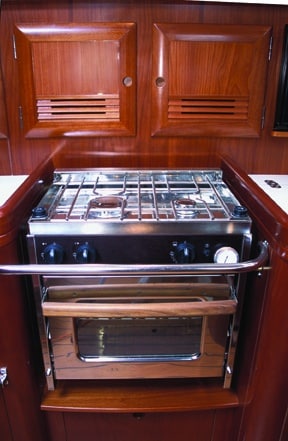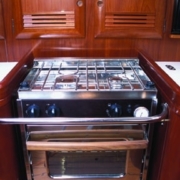Galley Stove on a Charter Boat

The vast majority of vessels in charter fleets are equipped with propane-burning galley stoves. Propane is heavier than air and leaked fuel stays low in the boat.
| Trivia Break – You may have heard this one. In olden times manure was transported on ships. The gases generated from the manure were heavier than air and collected in the bottom of ships. Someone smoking in the bowels of the boat could literally ignite the gas and explode the boat. Thus the crates of bags were labeled with Store High In Transit or S.H.I.T. Well literally that is SHIT. Snoopes.com shows that the origins of the word comes from German and has roots as far back as the 14th century. So it’s not true. If anyone tries to get that across you tell them what they are talking is …. |
Propane is colorless, odorless (although additives make it smell like rotten eggs), burns hot and cleanly, and is a good source of heat. The boat should have a propane detector (sniffer) near the floor that sounds an alarm when leaked gas is detected. The propane cylinder must be isolated in a dedicated external locker.
The propane tank must have a regulator, electrical solenoid shut-off, and manual cylinder shut-off. Its hose exits the propane locker through an air-tight gland and proceeds to the galley, where another manual in-line shut-off should be located. A flexible hose connects the line to the galley stove.
To operate the stove, first open the propane tank valve and turn the electrical solenoid switch – usually near the circuit breaker panel – on. Then open the manual valve, depress and turn the stove valve, and light the burner. After a few seconds, release the knob and adjust it to the desired flame. Some boats will require matches and on some boats, the electric igniter just doesn’t work – thus take matches (store them in a Ziploc bag). Someone always leaves open a hatch at night and the matches are usually stored under the hatch. Of course, Murphy’s Law says the night the hatch is left open is the night it rains is the night your matches get wet.
To turn the flame off, first shut off the manual valve at the tank to burn off all the fuel in the line, and then once the flame goes out from lack of fuel, turn the burner knob to the off position and shut the electrical solenoid.
There are significant dangers to propane, that you should be aware of on your charter trip. Propane is heavier than air and will collect in concentration in the bilge if unburned propane is allowed to escape from the stove. A simple ignition source like the automatic turning on of the bilge pump could cause enough spark to create an explosion. Treat the propane system with care. Open hatches when cooking and ensure you light the stove/oven as soon as you turn the knobs.
OBVIOUS BUT NEEDS TO BE SAID
Fire is a big hazard on board a boat and the propane stove is a major course. Ensure you and your crew know where the fire blanket and extinguishers are and that the blanket and extinguishers are readily available and inspected.






